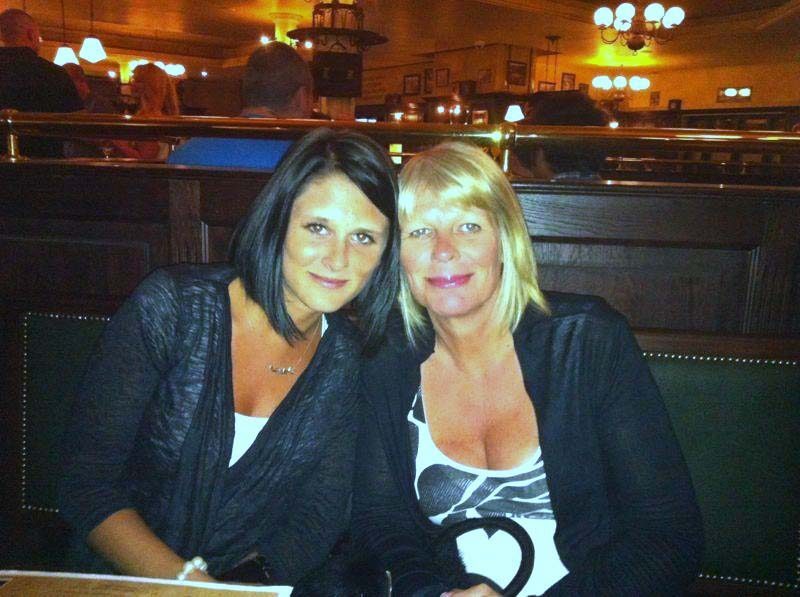
In a few weeks, Alison Patterson will again board a plane in the United Kingdom for a familiar 6.5-hour flight to Doha.
After arriving in Qatar, she’ll likely head to West Bay and check in at her favorite hotel, which she stays in every time she comes here because it triggers fond memories of her first visit to Doha to see her daughter, Lauren.

“Every time, the staff say, ‘Welcome back, but we’re so sorry you’re here,’” Patterson told Doha News.
Patterson has regularly traveled to Qatar to attend the criminal trial – and now appeal hearings – of the two men convicted in the murder of her daughter.
Lauren Patterson, a 24-year-old kindergarten teacher at Newton British School, was killed in October 2013. She was last seen outside a La Cigale Hotel nightclub with the two men convicted of killing her.
In March, a court sentenced Badr Hashim Khamis Abdallah al-Jabar to death for the teacher’s murder, while his friend, Mohamed Abdallah Hassan Abdul Aziz, was ordered to spend three years in prison for helping al-Jabar burn Lauren’s body as well as damaging and erasing evidence.
The verdict has been appealed, and as the legal process slowly moves forward, Alison Patterson continues to struggle with the reality of what’s happened.
“I can still imagine Lauren walk in. I haven’t come to terms with it at all. That’s what (my) counselor is working with me on … My counselor said that until court is finished, I won’t be able to deal with it,” she said.

The ongoing appeal hearing is expected to be one of the major news stories making headlines in Qatar in 2015.
Ahead of the next court session, which is scheduled for Jan. 18, Alison Patterson discussed with Doha News her memories of Lauren, the impact of her daughter’s death and her feelings toward the men convicted in her murder.
‘She was my best friend’
October 2013 wasn’t the first time Alison Patterson suffered the tragic death of a family member.
In 2008, while living in Luxembourg, her husband got up in the middle of the night and fell down a flight of stairs, breaking his neck.
His untimely death hit the family hard, and Patterson leaned on Lauren for support. Her eldest daughter adjusted her plans for university so she could help take care of her younger siblings – Georgia, 17, and David, 15 – as well as find a job to assist the family financially.
While working in Luxembourg, Lauren enrolled at The Open University, which specializes in distance learning, to earn her degree in teaching.
“She was determined to get an education … She always wanted to excel and anything she put her mind to, she succeeded at,” Patterson said.
Their relationship, she said, went beyond the mother-daughter bond.
“She was my best friend and someone I could turn to. Even when Lauren left to go to Qatar (in 2011), she would message me every morning and night to make sure I was OK. Every holiday, she would spend with me or I would travel to Qatar.”
Emotional and financial costs
Patterson said that hearing that her daughter had died was one of the hardest experiences she’s lived through.
She said she was given the news by a family friend who took a call from the British commonwealth office, a day after Lauren had been reported missing.
“They told me a body had been found but they were not 100 percent certain it was Lauren. I remember screaming ‘no, no.’ From that moment on a lot of what was said and happened I can’t remember properly. I think I have blanked it out.”
That pain is still constantly present, on top of other challenges Alison has been forced to face.

In the immediate aftermath of Lauren’s death, Patterson said she felt she was “manipulated and exploited” by the British media.
She was told her story was “exciting” and, after taking issue with some of the coverage, was informed by a newspaper that if she didn’t accept what was being written, “something much more interesting will come along.”
She said reporters would harass her with phone calls and show up at her door unannounced. Her home address, as well as photos of her younger children, appeared in print, she added.
Though the media attention has since waned, Patterson’s expenses have continued to climb.
Initially, many of the costs were covered.

Qatari officials, including the attorney-general’s office, paid for several flights and hotel room stays so Patterson could attend hearings. Lauren’s school in Qatar covered the cost of transporting her remains to the UK as well as several nights’ accommodations.
Additionally, friends and family members have made donations and organized fundraisers.
Despite this assistance, Patterson said she has still spent some £30,000 (QR171,647) of her own money and is still looking for ways to continue paying for her trips here – including selling Lauren’s car in Qatar.
Nevertheless, she said the financial and emotional support she’s received has been “overwhelming.”
“All the small things that people do or say matter a lot. All of this is an attestation to how much Lauren was loved,” Patterson said.
Death penalty
Reflecting on her loss has changed how Patterson feels about the fate awaiting al-Jabar if the appeals court upholds the death sentence – a punishment Qatar has not carried out in more than a decade.
“At first, I was seized by passionate anger and I wanted both (defendants) off the earth, gone … But after this time and now when I think about it from a moral standpoint, I feel that I can’t be as cruel as they have been. I’d be agreeing to exactly the same thing. Even though a murderer kills someone, they also have a family who would be going through the same thing if they are dead.”
Patterson said she would, however, like the men to be handed lengthy prison sentences. She said she finds the thought of them being released in even 20 years “scary,” especially since, from her perspective in the courtroom, the men have shown no remorse.

“There is no sign that they are scared. Their demeanor does not reflect an inkling of the enormity of what they’ve done.”
On the one hand, Patterson said she would like to believe that the two men, despite being responsible for her daughter’s death, have been unable to alter her outlook on life and people.
Yet she concedes that Lauren’s murder has robbed her of her sense of security and darkened some of her perspectives.
“I have become by far the greatest pretender. People do not realize how shattered I feel inside, but I have to pretend I am ok to get through this. I smile because it is the mask I have to wear…
No longer do I believe that all of life is good and fair. I will never return to the person I was before Lauren died.”
Thoughts?







